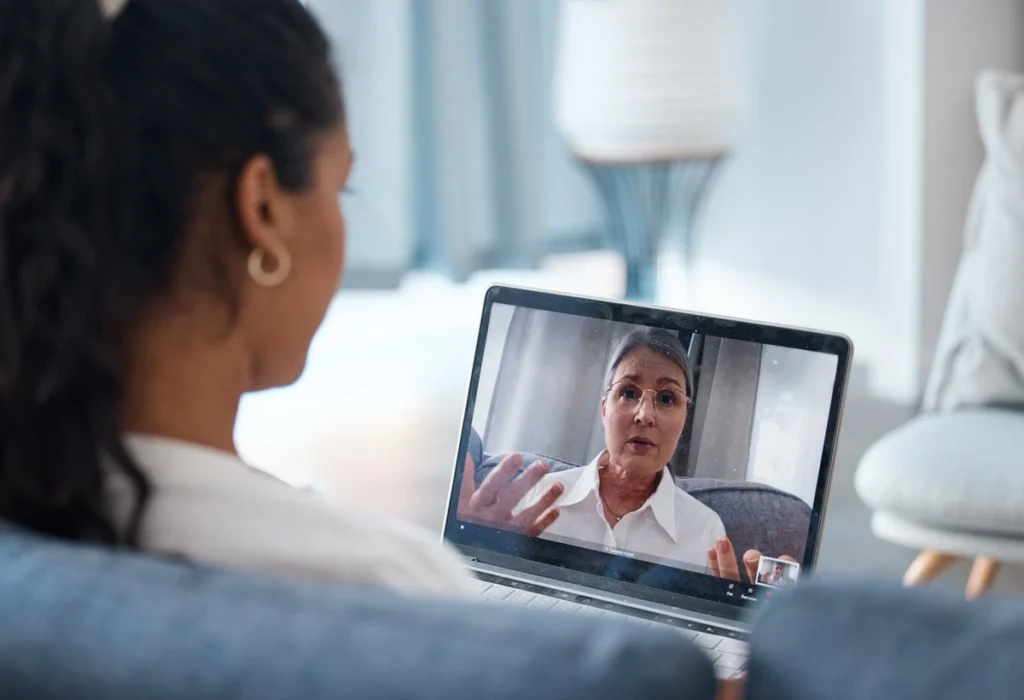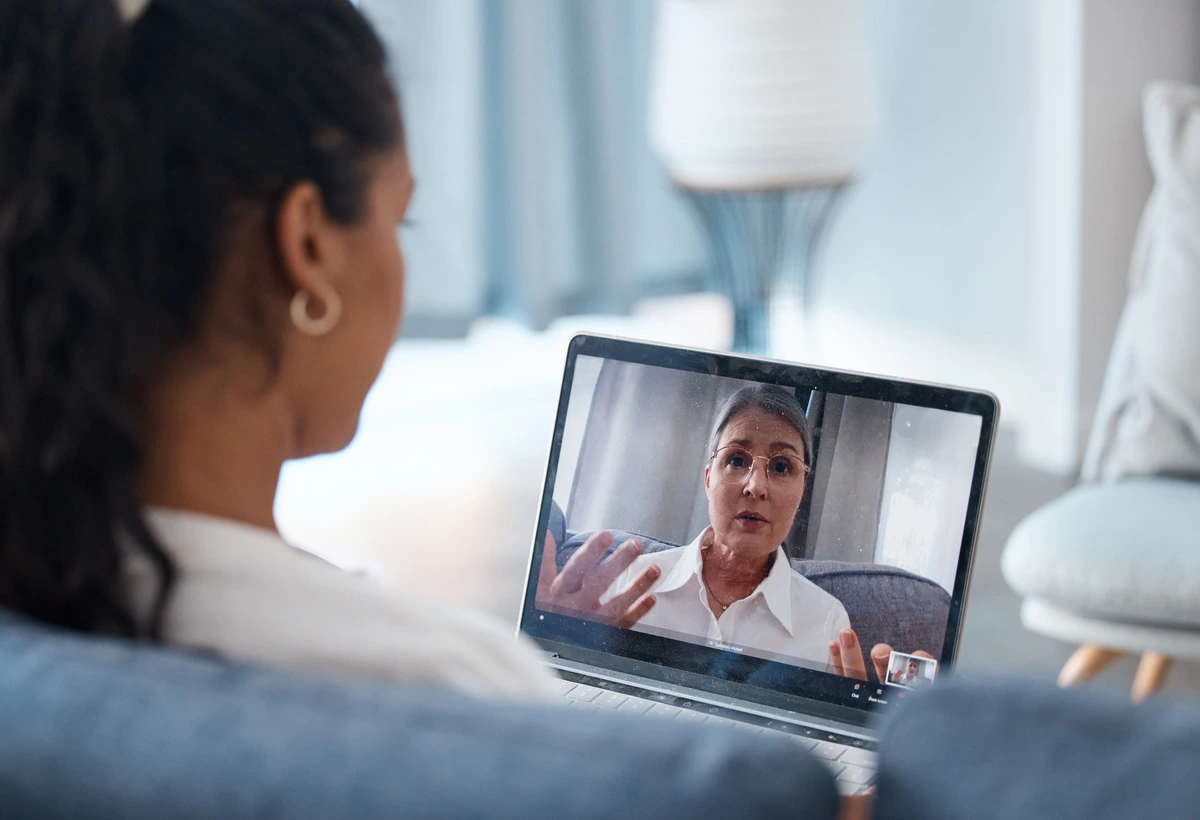
Benefits of Telehealth for Mental Health & Addiction Treatment in California
Healthcare delivery has transformed remarkably in recent years, with telehealth therapy sessions becoming essential for mental health and addiction treatment across California. This digital approach has revolutionized how Californians access vital support, breaking down barriers that once prevented many from receiving help and support from healthcare providers.
At Higher Purpose Recovery, we’ve embraced telehealth to reach clients throughout California. Our services connect people from San Diego to Sacramento with licensed specialists from the comfort of their homes, ensuring that distance, mobility, or scheduling never stand in the way of recovery.
The Evolution of Telehealth in California
Telehealth in California has evolved from basic video conferencing bridging geographical gaps to a comprehensive care model with sophisticated capabilities. High-definition video, secure messaging, mobile applications, and integrated health records now create virtual experiences that rival in-person treatment.
The adoption rates tell a compelling story. Before 2020, telehealth accounted for less than 1% of outpatient mental health visits in California. By mid-2022, this figure grew to approximately 40% of all mental health consultations.
While the pandemic accelerated adoption, telehealth has proven its effectiveness beyond crisis response. Today, it stands as an integral component of California’s mental health landscape, offering unique advantages traditional approaches cannot match.

Accessibility Benefits for All Californians
Eliminating Geographical Barriers
For individuals in rural California regions like the Northern Counties or Sierra Nevada foothills, accessing specialized services often meant traveling hours each way for a single appointment. Telehealth eliminates this obstacle. Someone in remote Humboldt County can now receive the same quality specialized counseling as someone in Los Angeles, requiring only an internet connection.
Reducing Transportation Challenges
Increasing Appointment Flexibility
Accommodating Physical Limitations
Privacy and Comfort Advantages
Treatment from the Privacy of Home
Reducing Stigma Barriers
Common Mental Health Disorders We Treat
Each mental health condition is unique, but many share common symptoms and treatment approaches. Below are some of the most common mental health disorders:
Depression
- Persistent sadness, loss of interest, fatigue, and hopelessness
- Can be triggered by trauma, life changes, or chemical imbalances
Anxiety Disorders
- Excessive worry, panic attacks, and avoidance behaviors
- Includes Generalized Anxiety Disorder (GAD), panic disorder, and social anxiety
Post-Traumatic Stress Disorder (PTSD)
- Flashbacks, nightmares, and hypervigilance from past trauma
- Common in survivors of abuse, combat veterans, and first responders
Post-Traumatic Stress Disorder (PTSD)
- Flashbacks, nightmares, and hypervigilance from past trauma
- Common in survivors of abuse, combat veterans, and first responders
Bipolar Disorder
- Extreme mood swings between depression and mania
- Affects energy levels, behavior, and decision-making
Borderline Personality Disorder (BPD)
- Emotional instability, fear of abandonment, impulsive behavior
- Often linked to childhood trauma and attachment issues
Obsessive-Compulsive Disorder (OCD)
- Unwanted, intrusive thoughts and repetitive behaviors
- Can interfere with daily routines and mental well-being
Schizophrenia & Psychotic Disorders
- Hallucinations, delusions, and disorganized thinking
- Requires long-term management with therapy and medication
Dual Diagnosis (Mental Health & Addiction)
- Substance use disorders often co-occur with mental health conditions
- Requires integrated treatment to address both issues
Creating a Comfortable Therapeutic Environment
Continuity of Care Benefits
Consistent Access During Life Transitions
Weather-Proof Appointment Scheduling
Preventing Treatment Gaps
Specialized Mental Health Care Through Telehealth
Virtual Therapy for Anxiety and Depression
Remote Addiction Counseling
Medication Management via Telehealth
Virtual Group Therapy
Group-based interventions have successfully adapted to virtual formats. Online support groups, skills-based classes, and therapeutic communities offer the benefits of peer connection without geographical limitations. These virtual groups often feature higher attendance rates due to reduced barriers to participation.
Higher Purpose Recovery Telehealth Services
At HPR Virtual Outpatient, we’ve developed a sophisticated telehealth platform designed specifically for mental health, prioritizing clinical effectiveness and user experience.
Secure and Private Platform
Our telehealth system employs advanced encryption and security protocols that exceed California’s strict privacy standards. This HIPAA-compliant platform provides the same level of privacy protection as in-person services, allowing clients to engage in treatment with full confidence that their sensitive information is secure.
Multi-Device Compatibility
We’ve designed our telehealth platform to function seamlessly across devices. Whether connecting via smartphone, tablet, laptop, or desktop computer, the system automatically optimizes for screen size and connection quality. Our mobile optimization ensures that even clients with only smartphone access can fully participate in all aspects of treatment.
Simple Setup Process
We’ve streamlined the technology onboarding process to ensure that even individuals with limited technical experience can easily connect with their providers. New clients receive clear, step-by-step setup instructions, and our administrative team offers pre-appointment technical orientation sessions for those who desire additional support.
Getting Started with Telehealth Services
Initial Assessment Process
Insurance and Financial Considerations
First Appointment Preparation
After scheduling your appointment, you’ll receive an email with a secure link to our telehealth platform, along with recommendations for creating an optimal virtual session environment. We suggest finding a private, quiet space with stable internet connectivity, testing your device’s camera and microphone beforehand, and having any relevant information prepared.
Evidence-Based Results
The effectiveness of telemedicine for mental health and addiction treatment is supported by a growing body of research, demonstrating outcomes comparable—and sometimes superior—to traditional in-person care.
Research examining telehealth interventions found virtual treatment produced outcomes statistically equivalent to in-person care across multiple diagnostic categories. For certain conditions, particularly agoraphobia and social anxiety disorder, some studies indicated telehealth actually outperformed traditional delivery methods.
Contact Higher Purpose Recovery Today!
Telehealth creates unprecedented opportunities for individuals to access support when and where they need it most. At Higher Purpose Recovery, we’ve witnessed how this expanded accessibility translates into tangible improvements in treatment engagement, consistency, and outcomes.
Whether you’re exploring treatment options for the first time, seeking more flexible alternatives to traditional care, or looking to maintain a connection with providers despite changing life circumstances, telehealth offers a viable, effective path forward.
Take the first step toward accessible, effective mental health and addiction treatment today.
Contact HPR for Virtual Outpatient Treatment at 949-844-3813 or visit our website to schedule a telemental health consultation. Our admissions team is available seven days a week to answer your questions, verify insurance coverage, and guide you through beginning your telehealth treatment journey.
Your path to recovery shouldn’t be limited by where you live, how you travel, or when you’re available. With telehealth at Higher Purpose Recovery Virtual Outpatient, it doesn’t have to be.






